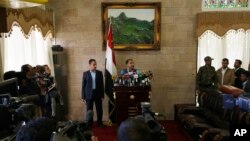The World Health Organization says it is seizing the opportunity offered by a newly enacted cease-fire in Yemen to bring in and distribute urgently needed medical supplies. A seven-day truce came into effect as Yemen’s warring parties began U.N.-sponsored peace talks at a secret location in Geneva.
The World Health Organization reports U.N. and private aid agencies are set to bring desperately needed relief supplies to the Yemeni people during the weeklong cease-fire.
WHO Representative in Yemen Ahmed Shadoul says 19 trucks are loaded with urgently needed medical supplies from the agency’s warehouses in the capital Saana and the major port city of Aden.
In addition, he says 150 metric tons of medical supplies will be shipped from its warehouse in Djibouti to Aden and Haditha.
‘We have requested unconditional movement of supplies, personnel, and teams to all parts of the country. We got the confirmation that this will be definitely granted from both sides," said Shadoul.
Dr. Shadoul says WHO plans to take advantage of the cease-fire to hold a national polio immunization campaign between December 19 and 23 targeting about five million children. He says another campaign is planned to provide regular vaccinations against childhood killer diseases between December 26 and 31.
WHO reports the Yemeni health system has collapsed, leaving millions of vulnerable people without essential medication and care.
Dr. Shadoul tells VOA children are at risk of life-threatening acute respiratory infections, pneumonia, measles, and meningitis.
“The most worrying thing is that most of the children in Yemen are malnourished and they are more prone to die if they caught anyone of those mentioned diseases and the vulnerability also extends to the women who are also malnourished, unfortunately," he said.
WHO reports 70 health facilities and 27 ambulances have been damaged in the war. It says a shortage of health workers is limiting access to care.










